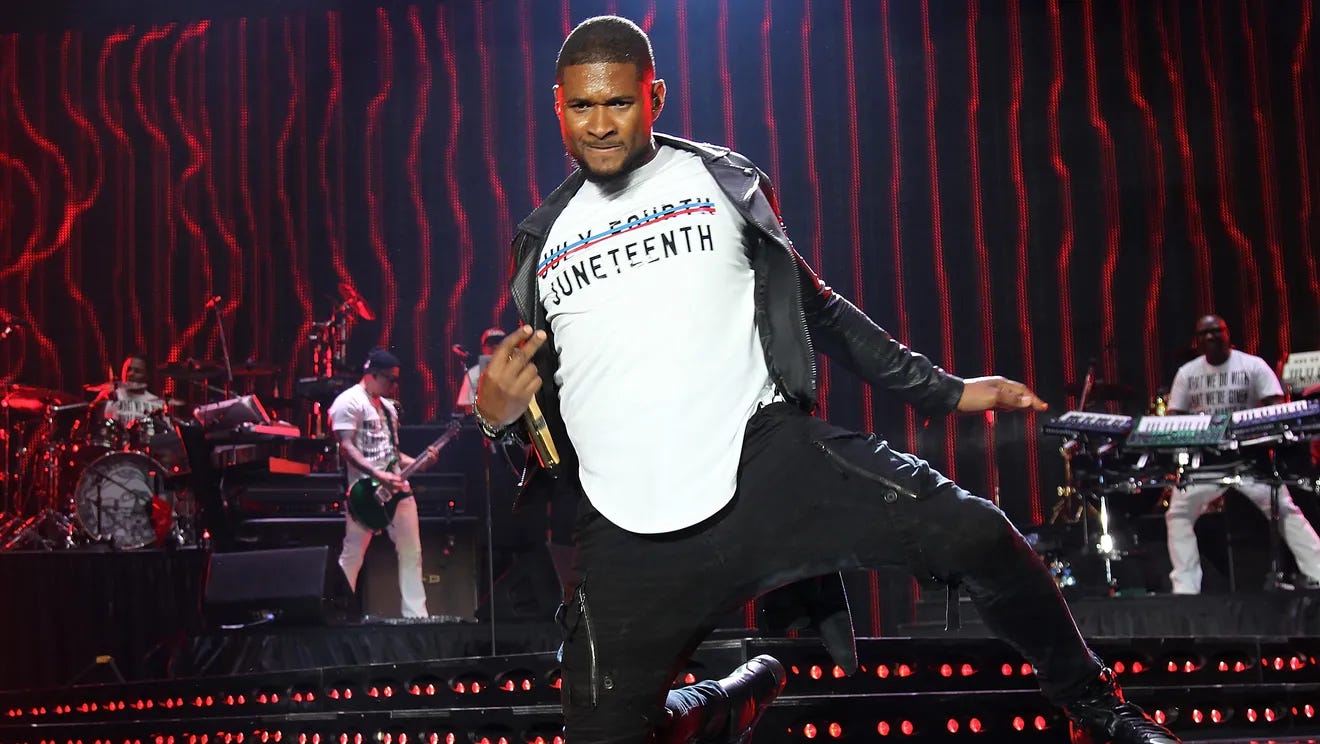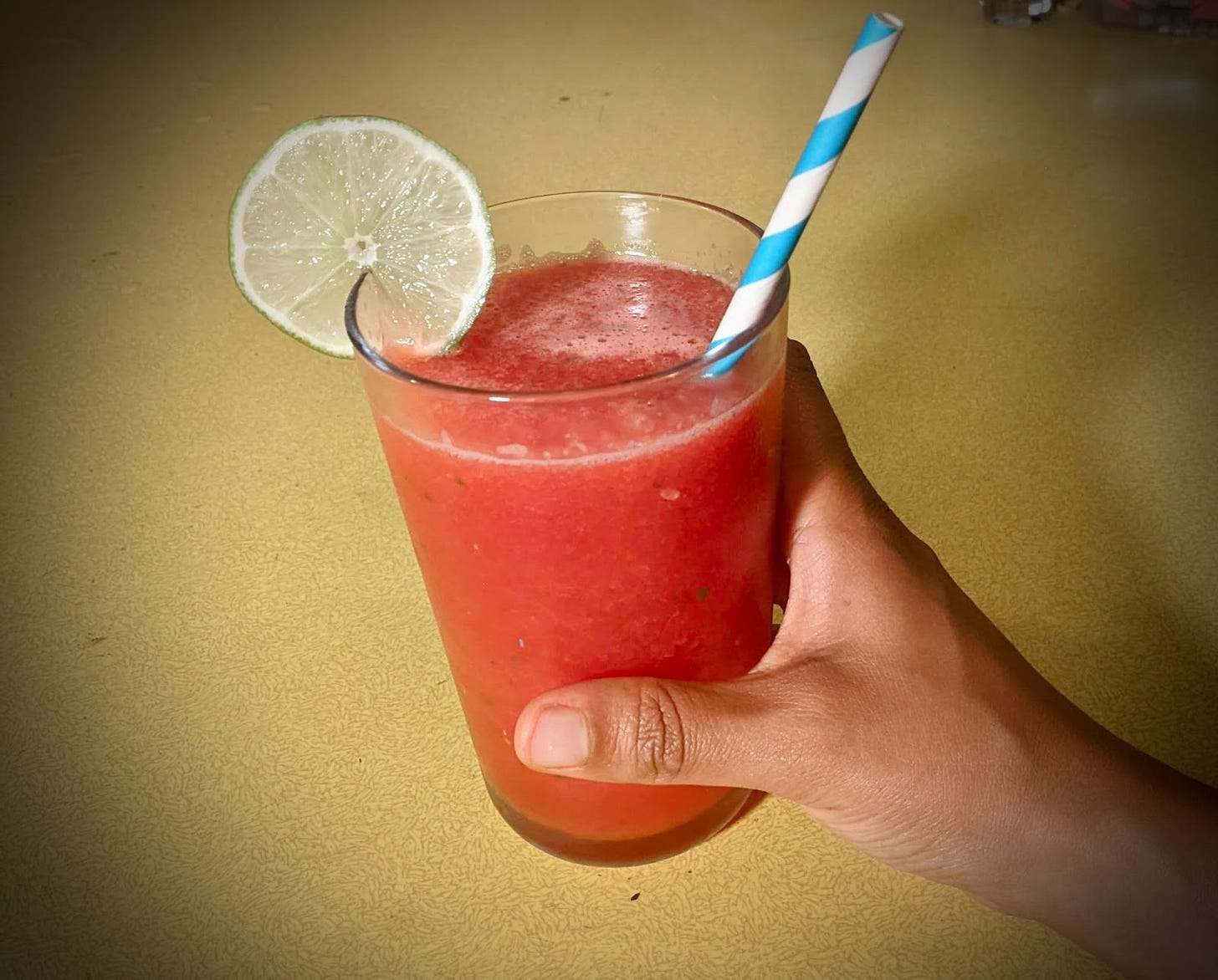The Nosh #4: Celebrating Usher Raymond's Independence Day
Juneteenth culinary traditions and why we are still thinking about the holiday two weeks later
We are on the cusp of a four day weekend dedicated to celebrating America’s freedom. But in a week in which the “Supreme” Court ended Affirmative Action as we know it, legally allowed businesses to refuse working with same-sex couples and put the kabash on Joey B’s student loan forgiveness plan…we aren’t feeling too much like celebrating America’s supposed, conditional “freedom”. So, in this issue of The Nosh, we are using the occasion of the Fourth to think more deeply about another holiday associated with liberation and freedom, Juneteenth.
Juneteenth was two weeks ago, but it’s still on our minds. We’ve been mulling over questions like: How can a holiday like Juneteenth serve as a launching pad to define our own celebrations and traditions? What happens when Juneteenth becomes part of national consciousness? And, how can we employ liberatory practices inherent in celebrations like Juneteenth and Pride in our everyday lives, in a country that wishes we wouldn’t?
Below, you’ll find some links to various media that are exploring these questions. And, of course, since The Nosh is about Noshing in the literal sense, we are bringing you some vibrant writing on Juneteenth food traditions that have nothing to do with hot dogs and hamburgers.
Wishing you a weekend of rest, resistance and celebrating what makes YOU feel free!
Today’s Menu:
Your Next Nosh: Red Drink and a Few Hours of Pure Liberation, by Jessie
This Week in Culture: A Lotta Links About Liberation (specifically and not so much), Curated by Alexis
Your Next Nosh: Red Drink and a Few Hours of Pure Liberation
If I could, Juneteenth would replace the Fourth of July. The food is better, the vibes are top notch and there is no other holiday in which liberation sounds like both Beyonce and Frankie Beverley. Some of my favorite Juneteenth memories are from post-pandemic Oakland when my friends and I emerged from our respective cocoons to dance, flirt, rest and eat by the lake in celebration of black liberation. It was one of the first real gatherings I attended during the post(ish) pandemic years, and being around such a crowd made me feel socially awkward, a little naughty and giddy with excitement. Even the lake in Oakland, which usually has a bit of that man-made funky lake smell going on, was glowing like the waters of Lake Minnetonka. It was a vibe.
Unlike many holidays that are important in my life, Juneteenth is a celebration that I only learned about as an adult, despite its rich history. I did an (awkward) informal poll to ask my friends, mostly based on the coasts, when and where they learned about Juneteenth– and similarly most of us learned about it in college classrooms, rather than through our family or friends. Nonetheless, for friends, including myself it has become an important holiday; a rare opportunity to think about what blackness and freedom and liberation actually means, and how we want to celebrate it. Juneteenth has been a place where we have been able to create our own version of the celebration that might just be passed down to the next generations. In this way, Juneteenth has looked a little different in my life every year.
On that favorable Juneteenth in Oakland 2 years ago, Juneteenth looked like bougie picnics, spontaneous queer dance parties, and black cowboys in their finest galloping through the blocked-off streets. Juneteenth was interactive art spaces where you could write about liberation and maybe talk to a cutie next to you. Juneteenth sounded like Footsteps in the Dark and, of course, Cameo’s Candy inspiring yet another electric side. It felt like being so at ease that you might just lay out on the lush pillows some friends put in the grass and celebrate liberation by taking a well deserved nap. (Resting is resistance after all).
Importantly –what does Juneteenth taste like? For me, Juneteenth food should evoke melanin, sunshine, dancing and relaxation. In Oakland, Juneteenth tasted like barbecue, brown liquor, 7-Up cake and mac and cheese so delicious I was routinely willing to risk all my digestive issues for a serving. Last weekend was my first Juneteenth in New York. It added the tastes of spicy Jamaican patties, tangy sorrel tea, blue crab on soft rolls and tamarind ice cream. This year I also turned to the writing of Nicole A. Taylor, a chef based out of Brooklyn and Athens, GA who wrote a cookbook of Juneteenth recipes. In it, she details her own journey of celebrating the holiday and shares some of her favorite Juneteenth recipes. She says Juneteenth eats are where “for a few hours, pure liberation meets a plate of food.” Here’s a photo of Nicole and me at this year’s Black Owned Brooklyn Juneteenth Food Festival.
Traditionally, red drinks are a norm on Juneteenth. For that occasion, and for the start of summer, this watermelon cooler is my own addition to Juneteenth traditions. It has the luxurious, nourishing taste of fresh fruit that makes you feel like you're on an island vacation and boasts that signature bright red color. The basil adds a little herby surprise and if you're feeling like you want a lil something extra, has enough flavor to hide whatever liquor you would like to add in to leave you feeling real nice.
Watermelon Basil Cooler:
Ingredients:
3 cups cubed chilled watermelon
2-3 basil leaves (depending on your desired herbaceousness)
4 cubes ice
1 tablespoons lime juice
Chilled white or brown rum to taste (Optional)
To Enjoy:
Chill watermelon and rum before blending (throw them in the freezer if you are short on time!)
Add all ingredients except rum to a blender. Blend until smooth and enjoy.
If adding rum, put desired liquor in your cup and add blended fruit. Taste and add in additional lime to balance the flavors as necessary.
This Week in Culture: A Whole Lotta Links About Liberation
In the week or so since Juneteenth, I’ve been thinking about holidays, both in how they are celebrated by the communities they are meant to honor AND how American capitalism interacts with these celebrations. I don’t think I’m the best person to publicly expound on these ideas at the moment- so this week, in lieu of my own essay, I am bringing you some cultural takes from across the internet, written and produced by some very smart cookies whose perspectives I value.
My guiding question when curating this list for my fellow Noshies was: What happens now that Juneteenth is part of the national American consciousness?
I thought about that question both specifically and broadly. Specifically, in the sense of understanding and appreciating how Black people everywhere are making this holiday their own AND also how non-Black people and corporations are co-opting this holiday for their own gain. I also pulled in a few pieces that explore, more broadly, how the language and ideas of activism are used (and misused) in the zeitgeist, and how people practice the liberatory actions inherent in Juneteenth in their everyday lives
I hope you are moved, inspired (and maybe, sometimes Infuriated??) by these pieces. Bon Appetit!:
Some celebratory reporting from a few public Juneteenth celebrations: Dodai Stewart’s thoughtful reporting for the New York Times on the Juneteenth Food Festival at Weeksville Heritage Center. Nyla Stanford and Denise Stephanie, for Vogue, wrote about and photographed the uber stylish, uber hype crowd at The Lay Out’s Juneteenth celebration in Brooklyn’s Fort Greene park. The Washington Post compiled dozens of photographs of Juneteenth celebrations from around the country.. And, culture writer Hunter Harris curated a collection of films and TV called Worlds of Black Abundance for AppleTV+.
Some media that explores what happens when Juneteenth became a national holiday: Shelby Stewart essay for OkayPlayer expands on her claim: “...It is crucial to emphasize that Juneteenth owes its existence to Texas.” As a surprise to literally no one, corporations, sports teams, and even a children’s museum in Indiana (?!?!?) have been using and misusing Juneteenth imagery, foods and symbolism- and have faced swift backlash in the process. Here’s Anna Gifty Opoku-Agyeman for NPR on celebrating Juneteenth in the age of commercialization. This essay by Trevon Logan and this viral Tweet call out America’s attempts to gaslight its Black population by declaring Juneteenth a national holiday in the age of book bans and restricted voting rights. And of course, there’s the Juneteenth episode from season 1 of Atlanta, which I won’t even attempt to describe here.
Some thinking on what happens when the language of activism and liberation, inherent to the social movements of the past several years, becomes common parlance: The extremely thoughtful therapist at the center of the excellent docu series Couples Therapy, Dr. Orna Guralnik, wrote an op-ed for the New York Times detailing her observations of how the Black Lives Matter and #metoo movements have positively impacted communication between many couples she works with- especially those in interracial and heterosexual relationships. Not so positively, the DEI industry is failing to live up to many of its promises (another thing that is likely a surprise to no one). In this essay for the Atlantic, Conor Friedersdorf takes corporations to task for dumping money into ineffective DEI training that could have been used to actually support marginalized people. And the title of Lily Zheng’s piece for the Harvard Business Review speaks for itself: “The Failure of the DEI-Industrial Complex”.
And lastly (and most importantly), some media highlighting folks for whom liberatory practices are an everyday kinda thing: In this episode of the Bioneers Radio podcast, entitled Black Food: Liberation, Food Justice and Stewardship, Bryant Terry and Karen Washington discuss how Black people already are and can continue to take control of their own food systems. Amongst many other things, they hit on food apartheid, getting food non-profits up and out of Black communities and reconnecting with ancestral agricultural knowledge. Cynthia Gordy Giwa and Tayo Giwa, the founders of Black-Owned Brooklyn, directed and produced the documentary The Sun Rises in the East about the 1970s, Bed-Stuy based, Black Liberation group The East. One of the original members of The East, Fela Barclift (aka Mama Fela), is the founder and director of Little Sun People- a Brooklyn childcare center with an African-centered curriculum. Fela and Little Sun people are the centerpiece of a podcast episode I produced for Fortune about community based childcare.
Please respond with your thoughts and links to any additional pieces or resources in the comments!
To Nosh On:
How do you celebrate liberation? What foods make you feel free, safe and at home? What food can you make for others that make them feel the same?








